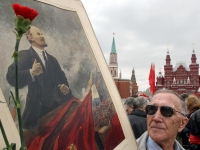Registration
You will receive an email confirming your registration.
IMGXYZ2524IMGZYXIn the absence of real politics in Russia, political discourse has shifted from the concrete to the symbolic. At the forefront of this discourse is the politics of historical interpretation. The authorities are struggling to use history and national memory to unite Russian society, without much success. Meanwhile, the renewed debate over the figure of Stalin exemplifies the political divisions in Russian society.
In 2009, Pro et Contra took up the question of the politics of history and memory. The Carnegie Moscow Center continued the debate with a panel discussion that examined the role of professional historians, history teachers, and civil society in the formation of a national historical narrative. Carnegie’s Sam Greene chaired the discussion.
History and society
Dmitry Dubrovsky, from Smolny College of Liberal Arts and Sciences, examined the increasing public interest in history:
- Stalin and civil society: Discussions on Stalin’s role in Russian history have mobilized people across different strata of society. The post-Soviet government, the Communist Party, left-wing public organizations, and liberal civil society groups are all using the public space as a platform for popularizing their own interpretations of Stalin.
- History and the media: Television and film have become the main instruments for bringing history to the general population. A series of films showcasing patriotic themes have been released in recent years, in particular “1612” and “Taras Bulba.” The Lipetsk Manifesto, formulated in May 2009 by a group of influential figures in the Russian film industry, outlines their vision of the role that movies and television should play in instilling patriotism in Russian youth.
Dubrovsky stressed that there is no common ideology tying historical interpretations together, and this has resulted in a fragmented cultural environment. Different political groups are invested in different historical interpretations, and any proposed national narrative would cover the demands of only a limited section of society, leaving the remaining portions unsatisfied.
The situation for historians in Russia
Alexey Miller of Central European University, Budapest, argued that the politics of history is ultimately about “how history and the collective memory are used as an instrument of internal political struggle.” Historians need to resist this trend towards the politicization of their profession.
- The role of historians: According to Miller, historians misconstrue their role in society, seeing themselves as authorized to interpret the past. Ideally, Miller argued, historians should limit themselves to searching for and collecting facts, in order to reduce the scope for manipulation. Miller concluded that the task of the historian is to present society with a “reservoir of arguments” for public discussion.
- The problems with public discussion: Russian historians have no clear vision of how to facilitate public discussions, both at the organizational and individual level. Studies have been written on how public discussions were organized in Germany and Austria. The resulting discussions have led to change in the norms of political correctness.
- The professional community: Russia does not have a professional community of historians. The culture of peer review has been destroyed by disarray and negligence, professional periodicals are in a disastrous state, and, Miller concluded, there is no national prize of any significance for historians. “We do not have reputations, and reputations thus cannot be lost,” he said. As a result, historians do little as a professional community to promote the works that they consider important for the formation of a national discourse. Miller argued that historians must make greater efforts to coordinate and organize themselves as a community; otherwise, the weight of historical research and the role of historians in society will fall.
History in schools
Filipp Chapkovsky, an independent journalist, spoke about some of the challenges of teaching history in an environment with no single institutional narrative.
- The role of textbooks: While the government seeks to support those history textbooks it believes to be “ideologically correct” (in particular, the textbooks by Filippov and Danilin), teachers still retain a lot of independence, including the freedom to choose between various textbooks with competing interpretations. Moreover, the history curriculum taught in schools is so condensed that there remains little space for ideology, and many teachers do not have time to teach students 20th century history, which is often the most highly politicized element of the discourse.
- Unified State Examination (USE): The national Unified State Examination sets the standards for what is taught in schools and is used to evaluate both students and teachers. The Ministry of Education can base the multiple-choice exam on whichever textbook it considers most suitable. However, only 18 percent of students elect to take the USE in history, and their results clearly demonstrate that students are weakly educated in 20th-century history.
- Information sources: School is not the main source of historical knowledge for students. Television, films, and the Internet have a greater influence on young people than what they learn in their history class in school.
- Stalin and young people: More than two thirds of young Russians view Stalin positively, a perception formed from the media and the Internet, not from their classes on Russian history.
Participants in the discussion stressed that, in order to make discussions of historical issues more productive both for professionals and the public, the politics of history and memory should be seen not as purely historical or theoretical, but rather in a broader cultural context.
